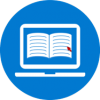Objectives
On completion of this activity, you will be able to:
- define key concepts pertaining to information literacy
- discuss the importance of information literacy in the 21st century
- evaluate whether you are information literate…
What is information literacy?
According to the Business Dictionary online, information is
[d]ata that is (1) accurate and timely, (2) specific and organized for a purpose, (3) presented within a context that gives it meaning and relevance, and (4) can lead to an increase in understanding and decrease in uncertainty.
Information is valuable because it can affect behavior, a decision, or an outcome.Read more: http://www.businessdictionary.com/definition/information.html
Dudeney, Hockly and Pegrum (2014: 22) define information literacy as the “ability to evaluate documents and artefacts by asking critical questions, assessing credibility, comparing sources, and tracking the origins of information”.
Checking the accuracy and timeliness of all documents and artefacts found on the web is now the responsibility of each and everyone. As a student of a foreign language, you need to ask critical questions about the information you find online, to compare it to what you already know or to widely accepted facts that you have memorised, and most importantly, to compare and contrast multiple sources of information (see Dudeney, Hockly and Pegrum, 2014: 23).
Why is Information Literacy important?
Information Literacy lies at the core of lifelong learning. It empowers people in all walks of life to seek, evaluate, use and create information effectively to achieve their personal, social, occupational and educational goals. It is a basic human right in a digital world and promotes social inclusion of all nations.
Alexandria proclamation on Information Literacy and Lifelong Learning (2005)
So, are you information literate?
Watch the video below and answer the questions asked…
Related activities
| Title | Related themes | Languages |
|---|---|---|
| Information literacy, what is it? | FR | |
| How to evaluate the credibility and reliability of a website | FR | |
| About Wikipedia... | FR |
Source/attribution: DigiLanguages Author: Françoise Blin
Voici quelques ressources supplémentaires en français…
Les ressources du site Internet sans crainte
Le site Internet sans crainte propose de nombreuses ressources (vidéos, fiches pédagogiques, etc.) destinées à un jeune public. Le thème, Je cherche, j’ouvre l’oeil offre des vidéos (qui peuvent être également utilisées pour des activités de compréhension orale).
Le site The Web We Want
Une ressource pédagogique en français pour encourager l’esprit critique: L’heure est à l’esprit critique (pdf).
Les vidéos de la chaîne YouTube Hygiène mentale
Pour aller plus loin…
Hier ein Artikel zum Begriff Filterblase aus der Zeit.
Klicksafe bietet Artikel zu den Themen Quellenkritik und Suchmaschinen für Kinder und Jugendliche im Internet.
Materiali aggiuntivi in italiano sull’alfabetizzazione mediatica:
Da leggere
- Un articolo dalla versione italiana di Wired sulla ragione per cui i ragazzi hanno difficoltà a riconoscere le bufale.
- Un articolo dalla versione italiano di Focus su come riconoscere le bufale online.
- Sei strumenti per riconoscere le bufale online, tratto da Slow News, sito fondato da un gruppo di giornalisti che presta particolare attenzione al controllo della veridicità delle notizie.
Da vedere
- Il seguente video è stato creato dalla EAVI (European Association for Viewers Interests) per sensibilizzare i ragazzi al significato dell’alfabetizzazione mediatica. Il video è un cartone animato dal titolo “A journey to Media Literacy“.
- Il video seguente, “Alfabetizzazione digitale e cybercittadinanza”, è stato realizzato per il progetto educativo “Non perdere la bussola”, nato dalla collaborazione tra la Polizia delle Comunicazioni, YouTube e il Ministero dellIstruzione, dellUniversità e della Ricerca per educare a un uso responsabile di Internet.
- Il canale YouTube di Butac propone video su come districarsi fra fattoidi e bufale in rete. In particolar modo il video Come riconoscere una bufala.

